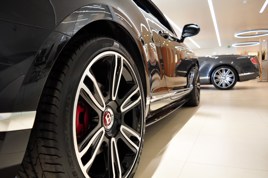Mike Todd, chief executive of Volkswagen Financial Services UK, ponders the need for motor retail to offer options which cater for all preferences, now and in the future.
Purchasing a car is a significant financial commitment. A commitment which doesn’t stop at the outlay for the vehicle itself, but continues with ongoing running costs– insurance, servicing, fuel, and even parking charges.
When we consider that against a backdrop of squeezed household finances, new models for car usage, and the attitudes of younger drivers, car ownership isn’t as black and white as it used to be. Drivers are increasingly interested in and exploring new and developing ownership and usership options.
As an industry and as a business it is not our role to dictate how drivers access vehicles, but it is our responsibility to ensure we’re offering options which cater for all preferences, now and in the future.
An increasing number of drivers are looking for access on an ‘as and when’ basis, whereas others still prefer a longer-term commitment to a specific vehicle. It’s our role to support more than one outcome to ensure all customers have access to their preferred option, while at the same time future proofing our business model.
Mobility for each journey
Owning a car is no longer a pre-requisite to driving and getting around. People are increasingly re-evaluating the mobility solutions that best suit their requirements, and owning a car in the traditional sense is now only one of the options for a lot of people.
The way we live and work has shifted hugely in recent years. Everyday car trips are happening less often for many, and the transition to hybrid working and online shopping has resulted in the average annual mileage dropping almost 2,000 miles. Add in the expansion of ULEZ zones, congestion charges, low traffic neighbourhoods and car parking charges, and car ownership is being more cautiously considered.
 Car rental, private hire vehicles, and public transport are all viable alternatives for many people, particularly those in urban areas. More and more, we’ll see people use whichever mode of transport best suits a journey, and what fits their lifestyle at that time.
Car rental, private hire vehicles, and public transport are all viable alternatives for many people, particularly those in urban areas. More and more, we’ll see people use whichever mode of transport best suits a journey, and what fits their lifestyle at that time.
Driving on demand
A car when you want one is an emerging option for those re-assessing car ownership and its financial practicalities. Some may want a car for an hour, others for a week, and some for months or years. It’s therefore no longer enough to only offer customers long-term ties to one vehicle.
Driver interest in on-demand car usage, such as car club membership or subscriptions, is on the rise, as more consumers are considering shorter and medium-term usage solutions. At the same time, there is huge number of drivers who do prefer long-term access to one vehicle. Innovation within automotive financial solutions, such as the Personal Contract Purchase, has made that accessible for many people for the first time.
Changing attitudes and actions of young drivers
The relationship between young people and car ownership and even driving is altering. We’re seeing a move away from the historical pattern of teenagers and young adults passing their driving test and entering a lifetime of traditional car ownership.
For many younger drivers, car ownership is viewed as being financially unattainable, and we are seeing a generational shift in the value of a connection to their own personal car.
The future landscape of car ownership and usership
We are at a pivotal moment when it comes to the future of mobility. Alongside the environmental, financial, and regulatory factors shaping the industry, consumers are increasingly interested in and receptive to alternative forms of car ownership and usership.
The next decade will be transformative. As businesses, we need to make sure our efforts mirror the interests and demands of customers, and that we are innovating and nurturing the ownership and usership models drivers of the future want.
Author: Mike Todd, chief executive, Volkswagen Financial Services UK






















Login to comment
Comments
No comments have been made yet.